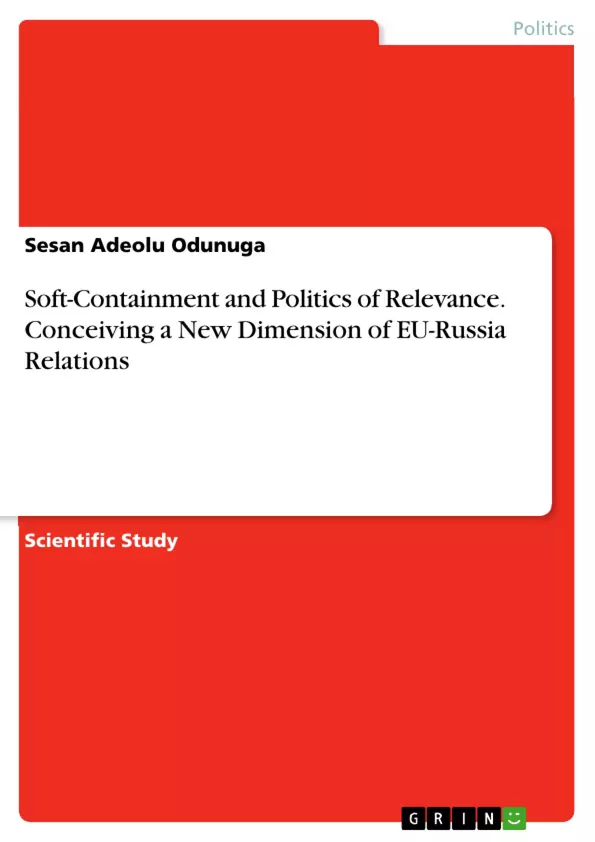The acceptable fact is that the relationship between the EU and Russia is famously characterized with conflict and cooperation. In a real life situation, conflict may engender cooperation, while cooperation also has the potential to degenerate into conflict. The end of the Cold War and the dissolution of the Soviet Union heralded the beginning of a new form of relationship between the EU and Russia, on the one hand, and between the United States and Moscow, on the other hand. In this conflict-cooperation paradigm of the EU-Russia relations, trust plays an important role. It is improbable to expect that a robust relationship would exist between Brussels and Moscow in a diplomatic atmosphere characterized with distrust and clash of foreign policy. In this regard, however, Brussels and Moscow seem to possess and pursue policies that are equidistant from each other. While Moscow tends to press for political relevance in Europe, Brussels attempts to confine Moscow to its Eastern borderlines. The article, therefore, describes the not-entirely-new but less-explore dimension of the EU-Russia relations: soft-containment vs. politics of relevance by tracing the process of engagement between the two actors (the EU and Russia) since the collapse of the Soviet Union using a qualitative method of research.
Key words: soft-containment, politics of relevance, post-Soviet space, EU, Russia
Inhaltsverzeichnis (Table of Contents)
- Abstract
- Introduction
- Russia and the West
- EU-Russia Relations just after the Collapse of the Soviet Union
Zielsetzung und Themenschwerpunkte (Objectives and Key Themes)
This article aims to explore a less-explored dimension of EU-Russia relations: the interplay between EU efforts at soft-containment and Russia's pursuit of political relevance in Europe. Using a qualitative research method, the article traces the process of engagement between the EU and Russia since the collapse of the Soviet Union.
- Soft-containment as a strategy employed by the EU
- Russia's pursuit of political relevance in Europe
- The role of trust in EU-Russia relations
- The impact of NATO enlargement on EU-Russia relations
- The influence of the United States on EU-Russia relations
Zusammenfassung der Kapitel (Chapter Summaries)
- Abstract: The article introduces the complex relationship between the EU and Russia, characterized by both conflict and cooperation. It highlights the role of trust and the differing goals of the two actors: EU containment and Russia's quest for relevance.
- Introduction: This section traces the thawing of relations between the Soviet Union and the West, particularly the US, during the later part of the Cold War. It highlights the significance of the INF Treaty and the eventual collapse of the Soviet Union.
- Russia and the West: This chapter discusses Russia's position after the Soviet Union's collapse, arguing that despite its territorial losses, Russia remains a significant player in global affairs. It highlights the influence of the US on EU-Russia relations and Moscow's pursuit of a multipolar world order.
- EU-Russia Relations just after the Collapse of the Soviet Union: This section focuses on the EU's efforts to establish a new relationship with Russia after the Soviet Union's demise. It highlights the Partnership and Cooperation Agreement (PCA) of 1994 and the EU's hope for a gradual transformation of Russia into a democratic society. However, the chapter also points to criticisms of the PCA for lacking provisions for security and foreign policy cooperation.
Schlüsselwörter (Keywords)
The article focuses on key terms such as soft-containment, politics of relevance, post-Soviet space, EU, Russia, trust, NATO enlargement, and US influence.
Frequently Asked Questions
What is "soft-containment" in the context of EU-Russia relations?
Soft-containment refers to the EU's strategy of attempting to limit Russia's political influence and confine it to its eastern borders through non-military means, such as diplomatic and economic policies.
What does "politics of relevance" mean for Russia?
It describes Russia's pursuit of political significance and a recognized role in European affairs, often striving for a multipolar world order where Moscow remains a major power.
How does trust impact the relationship between Brussels and Moscow?
Trust is a central factor; the lack of it often leads to diplomatic stalemates and prevents robust cooperation, as both sides frequently pursue conflicting foreign policy goals.
What was the significance of the 1994 Partnership and Cooperation Agreement (PCA)?
The PCA was the EU's primary legal framework for its relationship with Russia after the Cold War, aimed at supporting Russia's democratic transformation, though it was later criticized for lacking security cooperation.
How does NATO enlargement affect EU-Russia relations?
NATO's expansion into Eastern Europe is perceived by Moscow as a threat to its security, significantly increasing tensions and complicating the EU's diplomatic efforts with Russia.
- Arbeit zitieren
- Mr. Sesan Adeolu Odunuga (Autor:in), 2018, Soft-Containment and Politics of Relevance. Conceiving a New Dimension of EU-Russia Relations, München, GRIN Verlag, https://www.grin.com/document/434946



